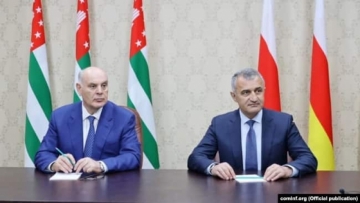When asked what issues were discussed during the talks, the presidents answered:
Anatoly Bibilov: We discussed all possible directions for relations development between the republics. We also shared our experience of the financial and tax components. We paid great attention to the issues of economic development. There was raised the question about the possibility of reanimating the Ossetia sanatorium in Abkhazia. It would be nice if the residents of South Ossetia could rest there in summer and improve their health. Since the range of issues discussed is very large, it is necessary to exchange experience in important areas. Joint activities between our structures, including the conduct of military exercises, are not ruled out, especially since the Agreement on Military Cooperation has already been signed.
Aslan Bzhania: I would like to highlight a few more topics that we discussed. These are issues related to ensuring the security of our states and neutralizing possible threats. The world, unfortunately, has not become more humane, and we need to share experience and information. Then there were questions related to the economy. In fact, we are experiencing many of the same problems and the unity of approach is a more likely chance for solutions to these problems. Anatoly Ilyich talked about the problems he faced, and I got the feeling that he was talking about Abkhazian history. We have a lot in common, so we discussed how to use our interaction more effectively to solve the above problems.
Aslan Bzhania also answered the question about the trade turnover between the republics.
“Our trade turnover in the first half of 2021 has doubled than in the entire 2020. If we keep this pace, then we can assume that by the end of 2021 it will quadruple, ” President of Abkhazia said.
Anatoly Bibilov also confirmed the fact of the growth of trade turnover between the Republic of Abkhazia and the Republic of South Ossetia and remarked: “The reanimation of our economic relations is definitely underway”.
The presidents also commented on the calls of Western countries to the Russian Federation to withdraw the recognition of South Ossetia and Abkhazia.
Aslan Bzhania: Such calls have nothing to do with the actual situation. They are not aimed at solving the problem, but at aggravating it. We will pursue our line, the truth is behind us. Of course, I would like the new reality to be recognized by all countries, this would help to solve many economic issues. But, apparently, the leadership of these countries, including Georgia itself, is not yet ripe for such a decision.
Anatoly Bibilov: These are the countries that seem to have a serious influence on the world stage. But if you look from the other side, then it is important to note that most other countries refused to support this statement. I will also note that this statement was made not for concrete actions, but for verbal support for Georgia. I think they know that Russia has never abandoned its decisions. The signing of an order on the settlement of issues of dual citizenship took place immediately after the statement of these countries. The Russian Federation has once again confirmed the invariability of its position in relation to South Ossetia and Abkhazia.
President of South Ossetia also answered a question about NATO exercises in Georgia and their possible impact on the situation in the region.
“Saber rattling has always been Georgia's trump card. All our life we see how Georgia is trying to solve problems by force. If they decide to conduct an exercise, let them do it. Referring to the agreements with the Russian Federation, which is our strategic partner, we firmly believe in the absolute security of our republic. We feel calm and confident, and we have every opportunity to respond to any provocation.
When asked what are the prospects for further recognition of South Ossetia and Abkhazia, Anatoly Bibilov answered: “The process of recognition of South Ossetia and Abkhazia is already an irreversible process. We see understanding and full support from many states for the position that we have. And we don't care how our opponents feel about it. These are their problems. They try to compromise any of our steps in the foreign policy arena or force those states with which we are doing certain work not to make any decisions, threatening sanctions or political destabilization. The process is difficult, no doubt, but no matter how many years have passed, we will in any case ensure that the number of countries that have recognized the independence of South Ossetia increases. We are taking serious steps in this direction ”.




